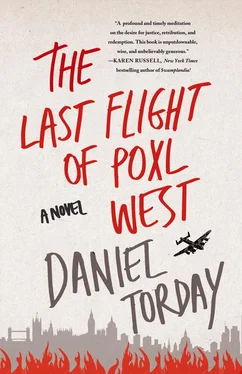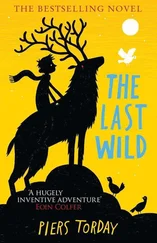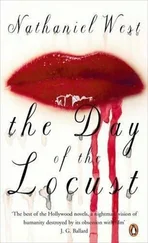“So you didn’t make it all up,” I said. He continued to look down into his coffee. “But you didn’t fly those planes like it said in your memoir.”
“Over the course of many, many years, I wrote three drafts of a book — novel or memoir, what did I care? Each was rejected. Each was the story of the first love of my life, a woman I’d come to love in Rotterdam and whom I’d turned around at the end of the war and sought out only after I realized how badly I’d wronged her. But it wasn’t enough. I’d been injured; I hadn’t flown sorties myself. If I’m honest, perhaps I tried too hard to espouse those emotions when they weren’t my own — it was a book of love and vengeance I’d sat down to write, not yet of love and remorse.
“And then Percy Smith died. He had no family, had lived out the last of his days in London, where I went to visit him when I could. He died a short, lonely, painful death from lung cancer, and when he died, I flew back for his funeral.”
I told him I remembered — he’d mentioned the flight back during those early days of our Cabot’s trips. He hadn’t provided much detail then.
“That’s right. I went to his funeral and thought, My own funeral can’t be long off. And only he knew about Herman Janowitz. He was the only one from that S-Sugar crew left, and now he was dead. So I picked the book back up, this novel that was now going to be a memoir. I thought of Janowitz, of my dearly departed friend Percy Smith, who had once been my enemy, of the shift I’d seen in them and the shift it had evinced in me. Here was a story I understood — not just a catalog of the things I’d seen — not just a profession of love — not just a paean to Françoise — but a story of vengeance, guilt, remorse and love. And then I began to do what Shakespeare would have done. I told a story — not factually what had happened, but bearing every drop of the truth of what had happened. As Iago himself said, ‘What you know, you know.’
“Do you know why Shakespeare left Stratford for London, where he gained his fame?”
I said I didn’t.
“It is a tale among scholars of the Bard that he was caught repeatedly poaching deer from a landowner near his father’s home. He would go onto this man’s land not because he needed to, but for the thrill of it — kill his deer, slip past his guards undetected. Samuel Johnson always claimed this was where Shakespeare learned his trade later: poaching. Almost every one of the thirty-nine plays was a story from history, a story someone else had told and the Bard retold. Some were even just versions of other stories other playwrights of the time were telling and he retold.
“Only Shakespeare, he learned to tell it better. This is the very crux of telling a story: to tell it better.”
“But,” I said, “you were writing in the first person. You were writing a memoir. You were—”
“And they attacked Shakespeare just as they did me! The leading playwright of his day. The greatest writer in the history of the English language. They called him an upstart crow, said he was beautified by their words. William Shakespeare himself! Torn down for what he did. But what matters, my boy, is the words on the page! Did I tell the story the best I could?
“I told the story the way it needed to be told! All of this book was true, Eli. I was a Czech Jewish teenager who left his home at the moment of the Anschluss, whose parents were killed by the Nazi aggression, who went to London by way of Rotterdam and who followed love and guilt’s demands back to try to find Françoise. This was my book, and if I refused to go on television and be berated for it. If I wrote the book I needed to write, I’ll not apologize for it. Not now! Not then!”
I was about to speak again. I was about to tell Poxl West that I thought I believed him but I needed to know more. He wasn’t right; of course I get that now. The very conviction with which he made his argument raised in me both a rage and an understanding I can’t explain. It strikes me now that this was what came to allow me to see Poxl in front of me for the first time right then, a man in all his sharp-elbowed contradictions. Sometimes it’s only undistilled anger that accompanies comprehension. The two cannot be extricated from each other.
But he believed what he was saying. He truly did. His red face was so full of life even now in its wasted state, I still would have listened to him tell any story he wanted, consequences be damned. And the world should have, too, I guess. Or maybe not. I still don’t know. But I do know that I wanted to let him know everything I’d felt and thought from the moment he came to our house during the Super Bowl until now.
But just then, I saw Mrs. Hornicker coming across the way. Her face was as red and sweaty as my uncle Poxl’s face had been minutes earlier. I didn’t even hear the next sentences Uncle Poxl spoke.
“Eli Goldstein, where on earth have you been?” she said.
I can tell you now what trouble I got in for having walked away, what a berating I got for having made her think she’d lost me in New York City on a field trip. Who can even imagine the fear I must have put into Mrs. Hornicker, her thinking she’d failed so miserably at her job. Just imagine if I’d accepted my uncle Poxl’s invitation and left the museum with him. By the time we got back to Needham, I was in about as much trouble as I ever got in. I received a suspension. My parents were livid, concerned it might hurt my chances at getting into the right college, and when I returned, they didn’t give me a chance to tell them I’d seen Poxl — and so I resolved not to. I might not have known I’d teach at a college someday, but I knew I’d get into one. Knowing what I knew about Poxl West now, and denied a chance to tell it as soon as I returned, with each day it got harder to imagine even trying to tell my parents about it. The further you get from a story whose moral you don’t know, the harder it grows to tell it. Who knew if they would even believe me, or if it would simply sound like a fantastical story told to deflect the trouble I was in. And isn’t that the very problem with even the simplest lie, let alone a lie the size of Poxl’s? It breeds suspicion, incredulity without bounds.
But that’s not what I remember of that moment.
What I remember is that Mrs. Hornicker wasn’t looking at me. She was staring straight at Poxl, who was sitting there across from me in the café at MoMA in midtown Manhattan. As scared as I was of her at that moment, as much as I wanted to continue talking with Poxl West, for just one moment all we could do was look at him — Mrs. Hornicker trying to figure out what I was doing talking to this man before she pulled me from him, and I seeing him as if for the first time:
He was an old man who’d run from his parents’ house without saying good-bye, who’d run from Rotterdam without saying good-bye to his first love. Only he knew what pushed him. Did Isaac sit around his father’s home for years, wondering what he might ask Abraham of their trip to the top of Mount Moriah, wondering what incomprehensible flash he’d seen in his father’s eyes? Once their descent was made and they were home, was it simply too complicated ever to raise the question? Or maybe he was just what he’d always been: Isaac’s father. Here I am now, a father myself, remembering again for the thousandth time the moment when I could have said the right thing. Anything. I’ll never know what went through his head when Poxl flew from Leitmeritz, when he flew from Rotterdam. This was the closest I would ever come. Couldn’t I have said one final true thing to a man who’d been a grandfather to me, if only I’d known then what it was I should say? But I didn’t. And I don’t. Mrs. Hornicker whisked me away, after I’d seen him one last time. And I guess if nothing else, I know what he looked like to her.
Читать дальше












